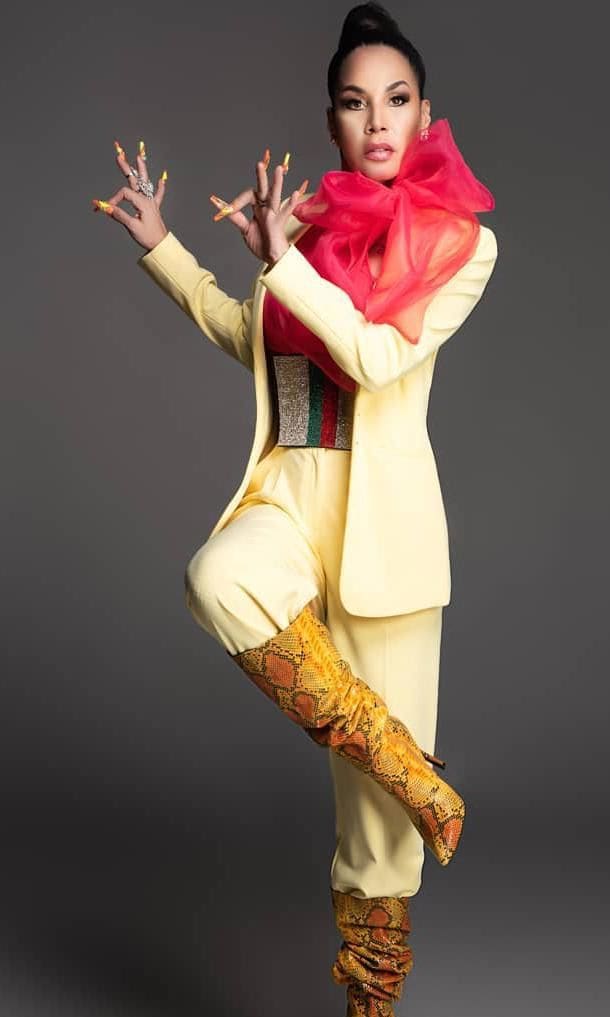You can call her the “La Reina del Reggaetón,” “La Caballota,” “La potra,” “La Diva” or simply Ivy Queen. One thing is for certain, Martha Ivelisse Pesante (Ivy’s birth name), was one of the first women to break down the barriers to entry in the Urbano music landscape. Her songs are filled with topics on female empowerment and how to unleash your inner #BossChica and have had a lasting impression on all her fans both in Latin America and the US. Ivy’s songs have paved the way for many of today’s artists like Karol G , Natti Natasha and, most notably, Rosalía .
Currently La Caballota is releasing a new single Un baile más and promoting her US tour, Raíz No Rama, which will be visiting 19 cities — Elizabeth, New Jersey, Houston, Texas, and Chicago (to name a few).
HOLA! USA caught up with La Reina del Reggaetón and she shared everything she had going on as well as revealed how much she admires Spanish singer Rosalía and how she considers her one of the best representatives of Urbano music.
HOLA! USA: Ivy, how has 2020 been treating you so far? Ivy Queen: “I am super happy, the year has started off strong. Everyone says you have to start off on the right foot, but I’ve started off on the right, left and with my entire body and soul working to make everything for my U.S. tour go smoothly as I am traveling by bus.”
Why are you traveling by bus? “This is the first time that I am going to be traveling by bus because I am normally forced to travel the world by plane. It will be an interesting experience. We are visiting 19 cities, but a lot can happen along the way, so we are preparing for the possibility of visiting 25 cities or more.”
What inspired the name of your tour (Raíz y no rama)? “The idea stems from a hashtag that I’ve been using on social media for that last one to two years in an informative sense. We know that you cannot see the raíz (root) of a tree, but it supports everything above it — in this case Urbano music. The root supports the rama (the branch), which can be taken away by the wind. My career represents the root, the part of the tree that has seen the most, yet is the longest lasting.”
You’re also releasing a new song Un baile más. “Yes, it’s a really meaningful song as it takes a look at the hypothetical scenario of ‘What if today was your last day? Who would you dance it with?’ I wanted to create something that both men and women could sing and dance to as many of my songs are geared at women. If I had to choose who I would dance ‘my last dance’ with it would be my daughter and my husband.”
How would you define the current state of Urbano music? “Something that fills me with a lot of gratitude and pride is when I seen American artists seeking out Latinx artists to collaborate on a song. Before Latinx artists needed to beg and sometimes pay for American artists to work with us, but now the ball is in our court because people recognize the power of Latinxers. Something that also makes me happy is having an artist like Bad Bunny in the mix — he is interesting and different. He has also paid his respects to me in a song, which I think is important and powerful. I also love Ozuna and would love to work with him.”
Who do you see as your possible successor, the next powerhouse of Urbano music? “I feel like all of them are like my daughters, regardless of whether they speak well of me or not. Like every mother, you have children that shine and others that are a bit more rebellious, but you love them all the same. I can see myself in a lot of them — when they wear colorful wigs, long nails with intricate art — it reminds me that I’ve made my mark. For example, Rosalía, who I was speaking to recently, seems like a breath of fresh air. Despite her not being a Latina, her flow and her singing ability is something that you can tell she puts her heart into, and I love that.”
What do you like the most about her? “Apart from her look and her voice, I have a high appreciation of her lyrics and if I were only to look at that aspect of her music, Rosalía would be my candidate as successor. What Rosalía possesses is something that you are born with, adding to that natural ability is the fact that she grew up listening to songs from Lola Flores as well as being raised with the proper tools at home much like me. I grew up listening to salsa, Celia [Cruz] and La Lupe. I also see myself in her flow and her passion for singing.”
Do you see a possible collaboration in the future? It would be a very interesting collaboration — both of us sitting together and writing. It would be a spectacular collaboration. I would love it.
,type=downsize)
